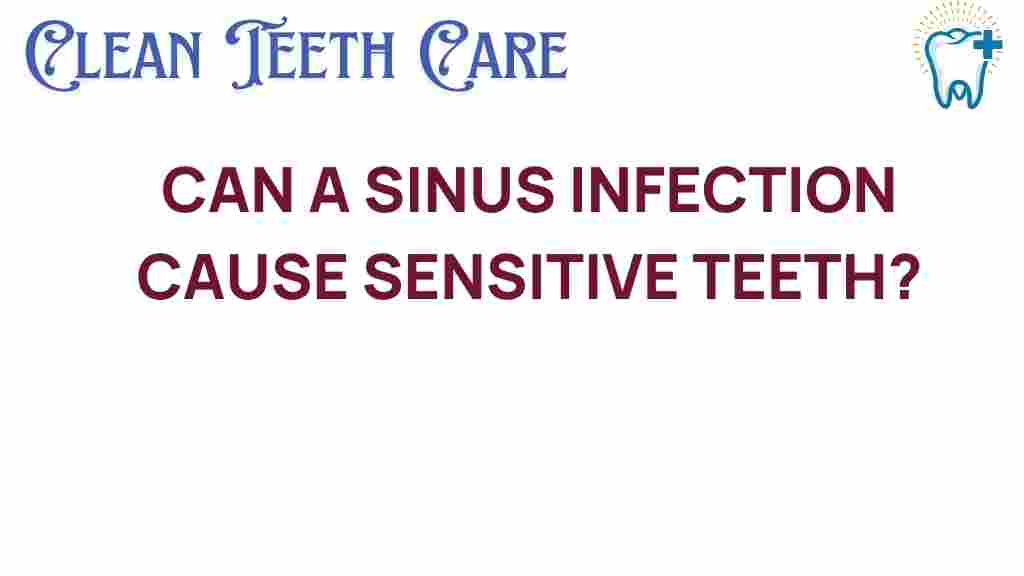Unveiling the Connection: Can a Sinus Infection Cause Sensitive Teeth?
When experiencing oral discomfort, many individuals often attribute their symptoms solely to dental issues. However, what if a sinus infection could also be a contributing factor to sensitive teeth? This article will explore the intricate connection between sinus infections and dental health, shedding light on how sinusitis can lead to teeth sensitivity. We will discuss symptoms, inflammation, and provide practical tips for managing both conditions.
Understanding Sinus Infections and Their Symptoms
A sinus infection, commonly referred to as sinusitis, occurs when the tissue lining the sinuses becomes inflamed. This inflammation can result from infections, allergies, or other irritants. The sinuses are air-filled spaces located in the skull that can become clogged, leading to discomfort and various symptoms. Understanding these symptoms is crucial in identifying whether a sinus infection is affecting your dental health.
Common Symptoms of Sinus Infection
- Facial pain or pressure, especially around the forehead, cheeks, and eyes.
- Thick, discolored nasal discharge.
- Postnasal drip leading to throat irritation.
- Reduced sense of smell or taste.
- Fever and fatigue.
- Cough and congestion.
Individuals with a sinus infection often experience several of these symptoms. If you’re also noticing teeth sensitivity, it may be more than just a dental issue.
The Link Between Sinus Infections and Sensitive Teeth
One of the lesser-known effects of sinusitis is its potential to cause sensitive teeth. The connection between a sinus infection and dental discomfort can be attributed to several factors:
1. Proximity of Sinuses to Dental Structures
The maxillary sinuses, located above the upper teeth, are particularly close to the roots of these teeth. When the sinuses become inflamed due to a sinus infection, the pressure and swelling can affect the roots of the upper teeth, leading to sensitivity. This can create a sensation similar to toothache, making it difficult to distinguish between dental and sinus issues.
2. Inflammation and Pressure
Inflammation in the sinuses can lead to increased pressure in the area. This pressure can irritate the nerves around the teeth, resulting in heightened sensitivity. When the sinuses are inflamed, they can also affect the surrounding tissues, increasing the likelihood of experiencing discomfort.
3. Postnasal Drip
Postnasal drip, a common symptom of sinus infections, can lead to throat irritation and inflammation in the mouth. This irritation can affect the gums and teeth, potentially leading to increased sensitivity. Furthermore, the acidic content of mucus can also contribute to enamel erosion if it comes into contact with teeth regularly.
Managing Sensitive Teeth and Sinus Infections
If you’re experiencing sensitive teeth along with a sinus infection, it’s essential to approach the problem from both angles. Here’s a step-by-step process to help manage both conditions effectively:
Step 1: Consult with Healthcare Professionals
If you suspect that your sensitive teeth may be related to a sinus infection, the first step is to consult with both a dentist and a healthcare provider. They can help determine the root cause of your discomfort. A dentist can check for any underlying dental issues, while a healthcare professional can evaluate your sinus symptoms.
Step 2: Treat the Sinus Infection
Managing the sinus infection is crucial for alleviating sensitive teeth. Treatment options may include:
- Decongestants: These can help reduce swelling and relieve sinus pressure.
- Nasal sprays: Saline or steroid nasal sprays can help reduce inflammation in the nasal passages.
- Antibiotics: If the sinus infection is bacterial, your doctor may prescribe antibiotics.
- Home remedies: Steam inhalation, warm compresses, and staying hydrated can also help relieve symptoms.
Step 3: Address Teeth Sensitivity
While treating the sinus infection, consider these tips for managing sensitive teeth:
- Use desensitizing toothpaste: This can help reduce sensitivity over time.
- Avoid acidic foods and drinks: These can worsen sensitivity and damage enamel.
- Consider fluoride treatments: These can strengthen enamel and reduce sensitivity.
- Maintain good oral hygiene: Regular brushing and flossing can help prevent additional dental issues.
When to Seek Further Help
While most sinus infections resolve with appropriate treatment, there are times when further medical attention is necessary. You should consult your healthcare provider if:
- Your symptoms persist for more than 10 days.
- You experience severe facial pain or swelling.
- You develop a high fever.
- Your sensitive teeth worsen or do not improve after treating the sinus infection.
Conclusion
In conclusion, a sinus infection can indeed cause sensitive teeth due to the inflammation and pressure exerted on the dental structures. Understanding this connection is essential for effective management and treatment. By addressing both your sinusitis and dental health, you can alleviate discomfort and improve your overall quality of life. Always consult with healthcare professionals to ensure you receive the most appropriate care.
For more information on dental health, visit our Dental Care Resources. If you’re looking for additional support on sinus health, check out this Sinusitis Treatment Guide.
This article is in the category Conditions and created by CleanTeethCare Team
